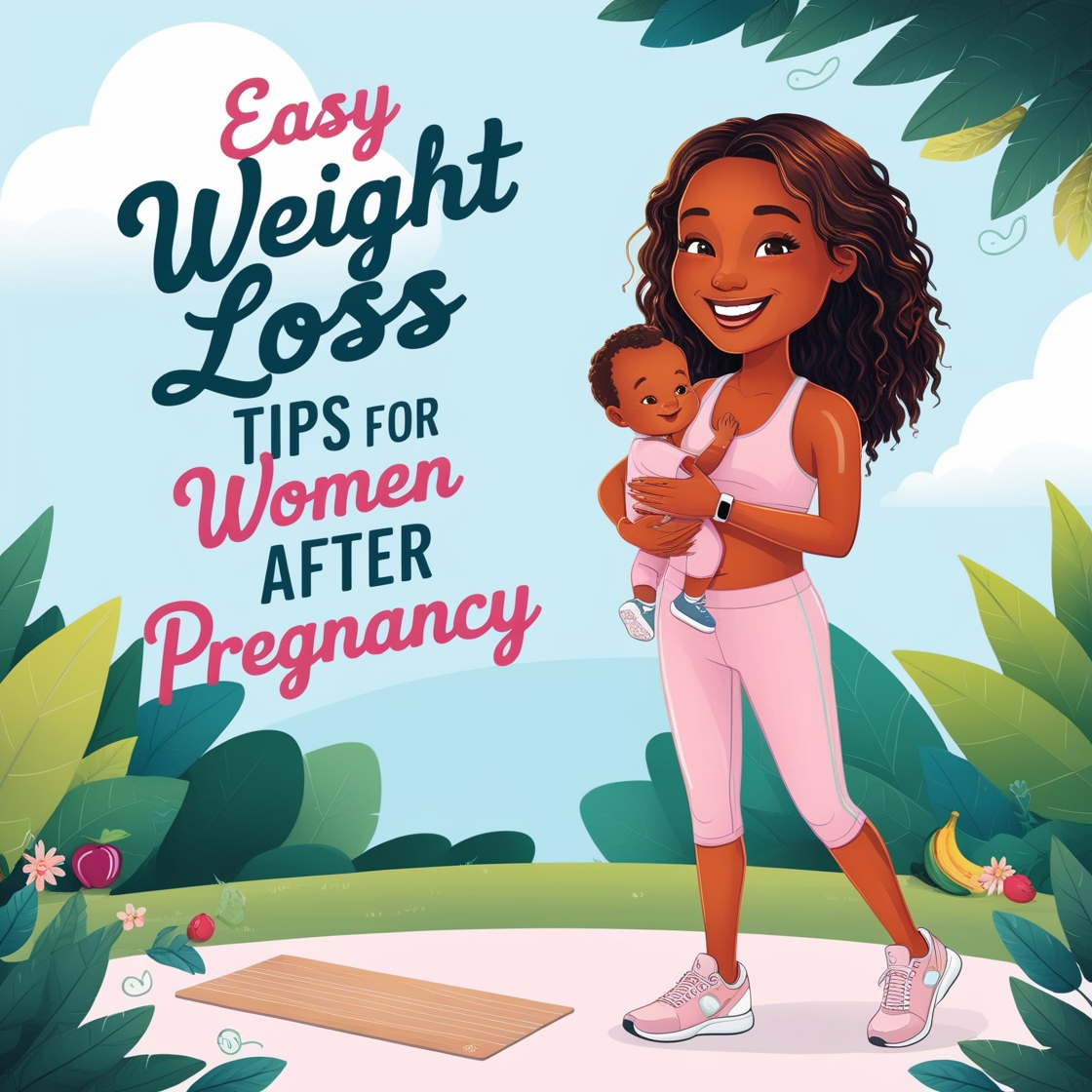Introduction
Pregnancy is a beautiful journey, but it comes with significant changes to your body, especially when it comes to weight. Shedding those extra pounds after giving birth can be challenging, but with the right approach, it is entirely achievable. In this article, we will explore easy and effective weight loss tips for women after pregnancy that are safe, sustainable, and suitable for new mothers.
The Importance of Postpartum Weight Loss
Why Focus on Weight Loss After Pregnancy?
Postpartum weight loss isn’t just about fitting into your pre-pregnancy jeans; it’s about your overall health and well-being. Carrying extra weight after pregnancy can increase the risk of various health issues, including diabetes, heart disease, and postpartum depression.
Risks of Postpartum Weight Retention
| Risk | Description |
|---|---|
| Diabetes | Increased risk of Type 2 diabetes due to insulin resistance. |
| Heart Disease | Higher chances of hypertension and cardiovascular diseases. |
| Postpartum Depression | Excess weight can contribute to emotional and psychological stress. |
| Joint Problems | Extra weight can put pressure on joints, leading to pain and discomfort. |
Read more about postpartum health risks.
Setting Realistic Weight Loss Goals

How Much Weight Should You Aim to Lose?
It’s important to set realistic weight loss goals. Aiming to lose 1-2 pounds per week is a healthy and attainable goal for most new mothers. Remember, your body needs time to recover from childbirth, so be patient with yourself.
Safe Weight Loss Goals
| Timeframe | Weight Loss |
|---|---|
| 1 Month | 4-8 pounds |
| 3 Months | 12-24 pounds |
| 6 Months | 24-48 pounds |
| 1 Year | 48-96 pounds |
Learn more about setting weight loss goals.
Nutrition Tips for Postpartum Weight Loss
Focus on a Balanced Diet
Eating a balanced diet is crucial for weight loss after pregnancy. Your body needs the right nutrients to recover from childbirth and to support breastfeeding if you are nursing.
- Eat Plenty of Fruits and Vegetables: These are low in calories but high in essential nutrients.
- Choose Whole Grains: Whole grains like oats, brown rice, and quinoa are rich in fiber and help keep you full.
- Incorporate Lean Proteins: Lean proteins such as chicken, fish, and legumes aid in muscle recovery and help with weight loss.
- Stay Hydrated: Drinking plenty of water helps with digestion and keeps you feeling full.
Sample Balanced Diet Plan
| Meal | Food Options |
|---|---|
| Breakfast | Oatmeal with berries, whole-grain toast with avocado |
| Lunch | Grilled chicken salad with mixed greens |
| Snack | Greek yogurt with honey, fresh fruit |
| Dinner | Baked salmon, quinoa, steamed broccoli |
Exercise Tips for New Moms

Start Slow and Gradually Increase Intensity
Exercise is an essential component of postpartum weight loss, but it’s important to start slow, especially if you’ve had a C-section or complications during delivery.
- Begin with Walking: Walking is a gentle way to get back into exercise. Start with short walks and gradually increase the duration.
- Incorporate Pelvic Floor Exercises: These exercises strengthen your core and help with postpartum recovery.
- Try Postpartum Yoga: Yoga helps in reducing stress, improving flexibility, and promoting overall well-being.
- Join a Postpartum Exercise Class: These classes are designed specifically for new mothers, ensuring that the exercises are safe and effective.
Beginner Postpartum Exercise Routine
| Exercise | Duration | Frequency |
|---|---|---|
| Walking | 20-30 minutes | Daily |
| Pelvic Floor Exercises | 10 minutes | 3-4 times a week |
| Postpartum Yoga | 30 minutes | 2-3 times a week |
| Strength Training | 20 minutes | 2 times a week |
Managing Stress and Sleep

The Role of Stress and Sleep in Weight Loss
Stress and lack of sleep can significantly impact your ability to lose weight after pregnancy. When you’re stressed or sleep-deprived, your body produces cortisol, a hormone that can lead to weight gain, especially around the abdomen.
- Practice Mindfulness: Meditation and deep breathing exercises can help reduce stress.
- Prioritize Sleep: While it can be challenging with a newborn, try to rest whenever possible. Even short naps can make a difference.
- Seek Support: Don’t hesitate to ask for help from family or friends to give yourself some downtime.
Tips for Managing Stress and Sleep
| Tip | Description |
|---|---|
| Create a Relaxing Routine | Develop a bedtime routine to help you wind down. |
| Limit Caffeine | Avoid caffeine in the late afternoon and evening. |
| Delegate Tasks | Don’t hesitate to ask for help with chores. |
| Practice Gratitude | Focus on positive aspects to reduce stress. |
The Importance of Support and Community
Lean on Your Support System
Having a support system is crucial when trying to lose weight after pregnancy. Whether it’s your partner, family, or a group of fellow new mothers, surrounding yourself with supportive people can make the journey easier.
- Join a Postpartum Support Group: These groups can provide both emotional support and practical advice.
- Share Your Goals: Let your loved ones know about your weight loss goals so they can encourage you.
- Stay Connected Online: There are many online communities and forums where you can share your experiences and get tips from other moms.
Resources for Postpartum Support
| Resource | Description |
|---|---|
| Local Support Groups | In-person groups that offer community and advice. |
| Online Forums | Websites where you can connect with other moms. |
| Health Care Providers | Consult your doctor for personalized advice. |
| Fitness Communities | Join fitness groups that focus on postpartum health. |
Conclusion
Losing weight after pregnancy is a gradual process that requires patience, commitment, and the right approach. By following these easy weight loss tips for women after pregnancy, you can achieve your goals in a healthy and sustainable way. Remember to prioritize your well-being, seek support, and celebrate every small victory along the way.
FAQs on Easy Weight Loss Tips for Women After Pregnancy
1. How soon can I start trying to lose weight after pregnancy?
It’s generally recommended to wait until your six-week postpartum checkup before starting any weight loss regimen. If you’ve had a C-section or complications during delivery, your doctor may advise waiting longer. Always consult with your healthcare provider before beginning any weight loss program.
2. Is it safe to lose weight while breastfeeding?
Yes, it is safe to lose weight while breastfeeding as long as you do it gradually. Rapid weight loss can affect your milk supply, so aim to lose 1-2 pounds per week. Eating a balanced diet and staying hydrated will support both your weight loss efforts and your ability to breastfeed.
3. What are the best foods to eat for postpartum weight loss?
Focus on nutrient-dense foods that provide energy and aid recovery, such as:
- Fruits and Vegetables: High in vitamins and low in calories.
- Whole Grains: Rich in fiber to keep you full longer.
- Lean Proteins: Essential for muscle repair and growth.
- Healthy Fats: Found in avocados, nuts, and fish, which are important for overall health.
4. How much exercise should I do to lose weight after pregnancy?
Start with gentle exercises, such as walking or postpartum yoga, and gradually increase the intensity as your body recovers. Aim for at least 150 minutes of moderate aerobic activity per week, combined with strength training exercises twice a week.
5. Can stress affect my ability to lose weight after pregnancy?
Yes, stress can negatively impact weight loss. High levels of stress lead to increased cortisol production, which can cause weight gain, particularly around the abdomen. Managing stress through mindfulness, adequate sleep, and support from loved ones can help you stay on track with your weight loss goals.
6. What if I’m not losing weight despite following a healthy diet and exercise routine?
Weight loss can vary from person to person, especially after pregnancy. If you’re not seeing results, it could be due to factors like hormonal changes, stress, or lack of sleep. Consider talking to a healthcare provider or a nutritionist for personalized advice and to rule out any underlying issues.
7. How important is sleep for postpartum weight loss?
Sleep is crucial for weight loss and overall health. Lack of sleep can disrupt your metabolism and increase cravings for unhealthy foods. While it can be challenging with a newborn, try to rest whenever possible, even if it means taking short naps throughout the day.
8. Are there any specific exercises I should avoid after pregnancy?
In the early postpartum period, it’s best to avoid high-impact exercises and those that put excessive strain on your abdominal muscles, such as heavy lifting, running, or intense core workouts. Focus on low-impact activities like walking, swimming, and gentle yoga until your body has fully recovered.
9. How can I stay motivated to lose weight after pregnancy?
Staying motivated can be challenging, but setting realistic goals, celebrating small victories, and seeking support from friends, family, or online communities can help keep you on track. Remember that postpartum weight loss is a journey, and it’s important to be patient with yourself.
10. What role does hydration play in postpartum weight loss?
Staying hydrated is vital for weight loss and overall health. Water helps regulate your metabolism, aids digestion, and can even help curb hunger. Aim to drink at least 8-10 glasses of water a day, and more if you are breastfeeding.
Related post:-
The Ultimate Guide to Sustainable Weight Loss
10 Weight Loss Exercises for Beginners: Get Started
Diet, Nutrition & Weight Loss: A Comprehensive Guide for Optimal Wellness

